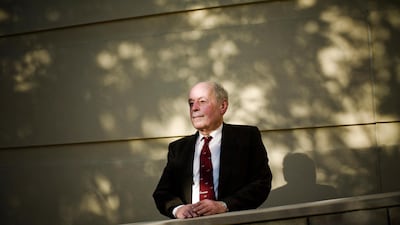Of the small team of diplomats charged with terminating Britain’s treaties with the seven emirates to form the UAE, Julian Walker was among the most significant and certainly the most active.
It was Walker, who has died in London at the age of 89, who spent the hours before the historic events of December 2, 1971, criss-crossing the northern emirates in a Wessex helicopter commandeered from the Royal Air Force, obtaining the signatures from each Ruler that would formally sever the ties that once bound them so closely to the now faded British Empire.
Walker’s role, though, was much more than a glorified messenger boy.
One of a handful of British foreign officials with a genuine understanding of the peoples of the Arabian Gulf, he was summoned back to what were then called the Trucial States in January 1971, as negotiations leading to the formation of the UAE reached perhaps their most critical phase.
It was Britain’s concern that, despite the tireless efforts of Sheikh Zayed and Sheikh Rashid, the Rulers of Abu Dhabi and Dubai, the prospective federation might yet fracture from internal pressures, and external interference from countries like Iran, which saw an opportunity for aggressive territorial acquisition as the UK removed its military forces from the region.
As Walker put it, in an interview for The National in 2008: "I learned in 1970 that my friends were in trouble and we were going to withdraw. There was no likelihood of an easy withdrawal."
That friendship had begun many years earlier with his appointment as political agent in the 1950s.
_______________
Read more:
The tenacious agent who put the emirates on the map
UAE's birth overcame friction and disputes, newly released documents show
_______________
Newly graduated from Cambridge University, Walker had hoped for diplomatic posting to Russia but instead was dispatched to Lebanon to learn Arabic.
In 1953 he was sent to Sharjah, then the hub of British operations in the Trucial States, and later to Dubai. In Abu Dhabi he established a close relationship with Sheikh Zayed, hosting the future President of the UAE and his brother Sheikh Hazza on a visit to London in 1955.
Postings to Bahrain, Oman, Iraq and Morocco followed, until his recall to the Gulf in 1971.
Walker’s particular responsibility was negotiating with the northern emirates and his lasting contribution - one which still remains to this day - was establishing formal boundaries and borders in territories that for hundreds, if not thousands of years, had been determined by tribal loyalties rather than points on a map.
The borders of Sharjah, Dubai, Umm Al Quwain and as far as Khor Fakkan on the Fujairah coast were all drawn up by Walker, on foot or by Land Rover.
As he recalled: “We had to map the whole place as no maps existed. I had to explore, get to know the territory, find out the opinions of tribesmen then consult Sheikhs Zayed and Shakbout before the boundaries were finalised.
"I think I made the right decisions and time has confirmed that. Only one boundary has changed since, in Dubai near Hatta, and that went undisputed.”
On December 2, Walker was one of three British diplomats present in Dubai to witness the formation of the UAE and the signing of a new Treaty of Friendship with the UK.
The atmosphere, he described as being of “jubilation and chaos” as a crowd of journalists surged forward at the crucial moment of signing.
Four decades later, for the 40th anniversary of the UAE, he reflected that: “There was a fair amount of excitement but in a way we had already got there. The big achievement and the big relief was the signing of the constitution on July 18.”
Walker remained in the UAE as British consul general in Dubai for another year, and eventually became ambassador to both Yemen and Qatar.
Following the 1991 Gulf War, Walker, now in his 60s, was called in to advise the UN committee working to agree the border between Iraq and Kuwait.
As a result of his contacts with Iraqi opposition members, he was also instrumental in launching an international campaign to publicise the plight of Iraq's Marsh Arabs, whose habitat was being drained as a part of a sustained genocidal assault by Saddam Hussein.
Despite officially retiring in 1994, to a house near the Thames in Chiswick, he continued to work as a consultant for companies working in the Middle East and retained a close connection with the UAE, giving freely his time and memories to journalists and historians, including the National Archives in Abu Dhabi.
He was the author of an eight volume collection of the boundaries of the UAE and Oman and a memoir, Tyro on the Trucial Coast. He enjoyed music, cooking and gardening.
Of his own contribution to the story of the UAE, he said it was simply "achieving and agreeing the UAE. The fact it still exists speaks for itself”.


